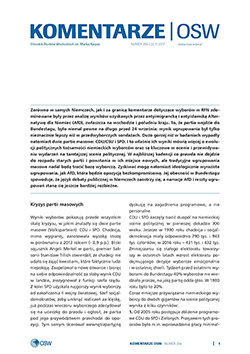Walka z korupcją na Ukrainie – w oczekiwaniu na rezultaty
Combating corruption in Ukraine – awaiting the results
Author(s): Piotr Żochowski, Marta Jaroszewicz
Subject(s): Governance, Public Administration, Public Law, Developing nations
Published by: OSW Ośrodek Studiów Wschodnich im. Marka Karpia
Keywords: Ukraine; corruption
Summary/Abstract: Systemic corruption has been the dominant problem of an independent Ukraine for more than two decades. The takeover of the state by a political-business group led by Viktor Yanukovych had been one of the principal causes for large-scale street protests during the Revolution of Dignity. Following the 2014 power shift, slogans calling for combating corruption and cleaning up the elites have featured among the most important priorities announced by President Petro Poroshenko and two consecutive prime ministers – Arseniy Yatsenyuk and Volodymyr Groysman. Moreover, the fight against corruption remains the West’s main condition to support Ukraine.It is difficult to make an unambiguous assessment of the achievements of the past three years. The frequently expressed view that the anti-corruption reform has failed cannot be accepted. Complex socio-political processes should not be measured in the short-term perspective. In a legal and institutional sense, much more has been done in the field of combating corruption than over the whole period of Ukraine’s independence. On the other hand, the actual results of anti-corruption activities are few in number. The Ukrainian leadership has lost its initial zeal for reform and the parliamentary majority frequently adopts legislation that hampers the fight against corruption. Resistance of a major portion of the political elite and of various interest groups has been increasingly evident. They fear that the anti-corruption reform will disable them from doing business according to former methods. The principal success involves the establishment of two independent institutions: the National Anti-Corruption Bureau of Ukraine (NABU) and the Special Anti-Corruption Prosecutor’s Office (SAP). This is accompanied by the systemic involvement of civil society in the fight against corruption. In both 2015 and 2016, drastically low number of court rulings regarding corruption-related crimes did not increase. However, in recent months, for the first time in history, several prominent politicians and officials have been arrested. This has triggered serious concern in influential political and business groups which, in response, have stepped up their efforts to fight independent anti-corruption institutions. Ukraine has neared a critical moment when the first high-ranking officials may be convicted of crimes. However, this is a very uneven fight since it is being waged only by those employees of the anti-corruption institutions, who are ready to break the ‘old ties’ with support from the international community and non-governmental organisations.
Series: OSW Commentary
- Page Count: 7
- Publication Year: 2017
- Language: Polish
- Content File-PDF

